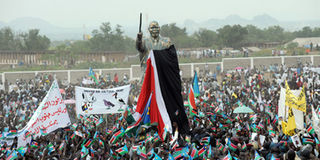Prime
S.Sudan cancels independence celebrations over Covid-19

In this file photo taken on July 09, 2011 A large crowd wave the flag of the new Republic of South Sudan during the unveiling of a statue of late South Sudan rebel leader and first Vice-President John Garang during a ceremony celebrating the independence of South Sudan from Sudan in the capital Juba. PHOTO/AFP
What you need to know:
- South Sudan, which marks a decade of independence on July 9, is the world's youngest country and also one of the poorest, crippled by a devastating civil war that has left tens of thousands of people dead.
South Sudan's Council of Ministers has resolved that there will be no official celebrations for the country’s 10th independence anniversary on Friday over fear of coronavirus.
The council also postponed the arranged swearing in of the new transitional legislature from Friday to a date yet to be announced.
In an extraordinary sitting chaired by President Salva Kiir in Juba on Wednesday, the cabinet advised the public to mark the day in their homes as part of measures to prevent the spread of Covid-19.
Deputy National Information Minister Baba Medan said that President Kiir will speak to citizens in a televised address on Friday.
“Putting into consideration the situation of Covid-19, the president directs the citizens of South Sudan to celebrate in their own houses, and there will be an official national address from the president, everyone will see or hear from their radios and TVs, so that we will be avoiding any health issue,” said Medan.
South Sudan, Africa’s youngest nation, is marking 10 years of independence on Friday.
The country had fought a 21-year civil war with Khartoum before attaining autonomy in 2005. It received independence following a referendum in 2011 in which the majority of the population voted to separate from the Sudan.
But shortly after celebrating this win, the country plunged into a civil war just two years later. A peace deal was reached but another bout of conflict erupted in 2016, before a second peace deal—the revitalized peace agreement of 2018—was reached.
Despite all the civil wars and sufferings, South Sudan is banking on the revitalised peace agreement to rebuild its institutions, according to the official government bulletin released this week. It is relying on the hopes of its people to rally for that goal.




